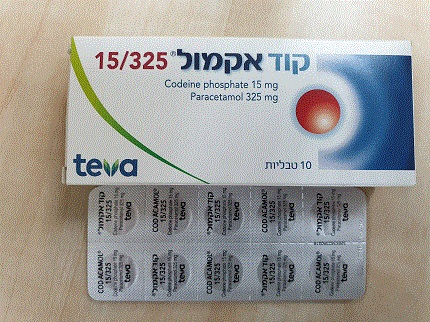Quest for the right Drug

קוד-אקמול 15/325 COD-ACAMOL 15/325 (CODEINE PHOSPHATE, PARACETAMOL)
תרופה במרשם
תרופה בסל
נרקוטיקה
ציטוטוקסיקה
צורת מתן:
פומי : PER OS
צורת מינון:
טבליה : TABLETS
עלון לרופא
מינוניםPosology התוויות
Indications תופעות לוואי
Adverse reactions התוויות נגד
Contraindications אינטראקציות
Interactions מינון יתר
Overdose הריון/הנקה
Pregnancy & Lactation אוכלוסיות מיוחדות
Special populations תכונות פרמקולוגיות
Pharmacological properties מידע רוקחי
Pharmaceutical particulars אזהרת שימוש
Special Warning עלון לרופא
Physicians Leaflet
Interactions : אינטראקציות
4.5. Interaction with other medicinal products and other forms of interaction The hypotensive effects of antihypertensive agents, including diuretics, may be potentiated by codeine. Quinine or quinidine may inhibit the analgesic actions of codeine. The CNS depressant action of Cod Acamol may be enhanced by coadministration with any other drug which has a CNS depressant effect (e.g. anxiolytics, hypnotics, antidepressants, antipsychotics and alcohol). Concomitant use of any drug with a CNS depressant action should be avoided. If combined therapy is necessary, the dose of one or both agents should be reduced. Concomitant administration of Cod Acamol and MAOIs or tricyclic antidepressants may increase the effect of either the antidepressant or codeine. Concomitant administration of codeine and anticholinergics may cause paralytic ileus. Concomitant administration of codeine with an anti-diarrhoeal agent increases the risk of severe constipation, and coadministration with an antimuscarine drug may cause urinary retention. The absorption of paracetamol is speeded by metoclopramide or domperidone, and absorption is reduced by cholestyramine. Codeine may delay the absorption of mexiletine, and cimetidine may inhibit codeine metabolism. Opioids may interfere with the results of plasma amylase, lipase, bilirubin, ALP, LDH, AST, and ALT tests. The effects of codeine on the gut may interfere with diagnostic tests of gastro-intestinal functions. The anticoagulant effect of warfarin and other coumarins may be increased by long term regular daily use of paracetamol, with increased risk of bleeding. Occasional doses of paracetamol do not have a significant effect on these anticoagulants. Sedative medicines such as benzodiazepines or related drugs: The concomitant use of opioids with sedative medicines such as benzodiazepines or related drugs increases the risk of sedation, respiratory depression, coma and death because of additive CNS depressant effect. The dose and duration of concomitant use should be limited (see section 4.4). Flucloxacillin: Caution should be taken when paracetamol is used concomitantly with flucloxacillin as concurrent intake has been associated with high anion gap metabolic acidosis, especially in patients with risks factors (see section 4.4)

שימוש לפי פנקס קופ''ח כללית 1994
Mild to moderate pain
תאריך הכללה מקורי בסל
01/01/1995
הגבלות
תרופה שאושרה לשימוש כללי בקופ'ח
מידע נוסף
